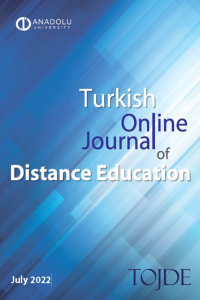Abstract
References
- Adams, R. V., & Blair, E. (2019). Impact of time management behaviors on undergraduate engineering students’ performance. Sage Open, 9(1), pp. 1-11.
- Aggarwal, A. K., & Bento, R. (2000). Web-based education. In A. Aggarwal (Ed.), Web-based learning and teaching technologies: Opportunities and challenges (pp. 2-16). Hershey, PA: Idea Group.
- Annetta, L. A., Folta, E., & Klesath, M. (2010). V-Learning: Distance education in the 21st century through 3D virtual learning environments. North Carolina: Springer Science & Business Media.
- Appana, S. (2008). A review of benefits and limitations of online learning in the context of the student, the instructor, press the tenured faculty. International Journal on E-learning, 7(1), 5-22.
- Austin, E. W., & Pinkleton, B. E. (2015). Strategic public relations management: Planning and managing effective communication campaigns. New York: Routledge.
- Bryan, V. C., Musgrove, A. T., & Powers, J. R. (Eds.). (2017). Handbook of Research on Human Development in the Digital Age. Hershey: IGI Global.
- Cater III, J. J., Michel, N., & Varela, O. E. (2012). Challenges of online learning in management education: An empirical study. Journal of Applied Management and Entrepreneurship, 17(4), 76.
- Chami, H. (2020). Reframing education. Beirut: Dar Al Kalam.
- Chevalier, A., Marinova, E., & Pena-Chocarro, L. (Eds.). (2014). Plants and people: choices and diversity through time (Vol. 1). Oxford: Oxbow Books.
- Chien, S. Y., Hwang, G. J., & Jong, M. S. Y. (2020). Effects of peer assessment within the context of spherical video-based virtual reality on EFL students’ English-Speaking performance and learning perceptions. Computers & Education, 146, 103751, 1-48.
Abstract
This study aims to examine the benefits of incorporating online courses, MyELT, for General English (GE) curricula and to investigate the challenges that negatively affect the expediency of the courses in improving the students’ English proficiency and digital literacy. 351 participants were randomly selected and responded to a questionnaire and out of which 15 were conveniently selected for a semi-structured interview. Qualitative data was also collected through personal journaling to record hidden challenges for the expediency of MyELT. The data were analyzed through descriptive statistics and content analysis. The findings correlated and revealed that MyELT courses were beneficial in their flexibility as they helped fulfilling GE courses’ description and proportionately improved students’ English proficiency and digital literacy. Neither students’ perceptions nor teachers’ roles and background were challenging factors. The expediency of MyELT was, thus, challenged by four factors namely: teachers’ teaching practices, their inability to mentor students’ performance which further instigated some students to do unethical practices, the company system of accessibility, and MyELT courses content
References
- Adams, R. V., & Blair, E. (2019). Impact of time management behaviors on undergraduate engineering students’ performance. Sage Open, 9(1), pp. 1-11.
- Aggarwal, A. K., & Bento, R. (2000). Web-based education. In A. Aggarwal (Ed.), Web-based learning and teaching technologies: Opportunities and challenges (pp. 2-16). Hershey, PA: Idea Group.
- Annetta, L. A., Folta, E., & Klesath, M. (2010). V-Learning: Distance education in the 21st century through 3D virtual learning environments. North Carolina: Springer Science & Business Media.
- Appana, S. (2008). A review of benefits and limitations of online learning in the context of the student, the instructor, press the tenured faculty. International Journal on E-learning, 7(1), 5-22.
- Austin, E. W., & Pinkleton, B. E. (2015). Strategic public relations management: Planning and managing effective communication campaigns. New York: Routledge.
- Bryan, V. C., Musgrove, A. T., & Powers, J. R. (Eds.). (2017). Handbook of Research on Human Development in the Digital Age. Hershey: IGI Global.
- Cater III, J. J., Michel, N., & Varela, O. E. (2012). Challenges of online learning in management education: An empirical study. Journal of Applied Management and Entrepreneurship, 17(4), 76.
- Chami, H. (2020). Reframing education. Beirut: Dar Al Kalam.
- Chevalier, A., Marinova, E., & Pena-Chocarro, L. (Eds.). (2014). Plants and people: choices and diversity through time (Vol. 1). Oxford: Oxbow Books.
- Chien, S. Y., Hwang, G. J., & Jong, M. S. Y. (2020). Effects of peer assessment within the context of spherical video-based virtual reality on EFL students’ English-Speaking performance and learning perceptions. Computers & Education, 146, 103751, 1-48.
Details
| Primary Language | English |
|---|---|
| Journal Section | Articles |
| Authors | |
| Publication Date | July 1, 2022 |
| Submission Date | June 27, 2021 |
| Published in Issue | Year 2022 Volume: 23 Issue: 3 |


